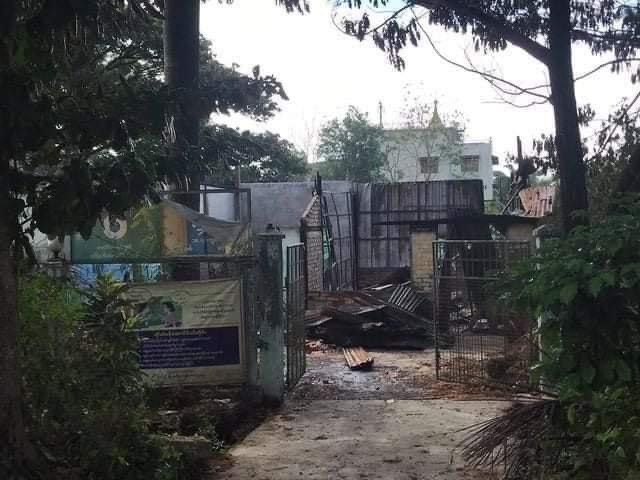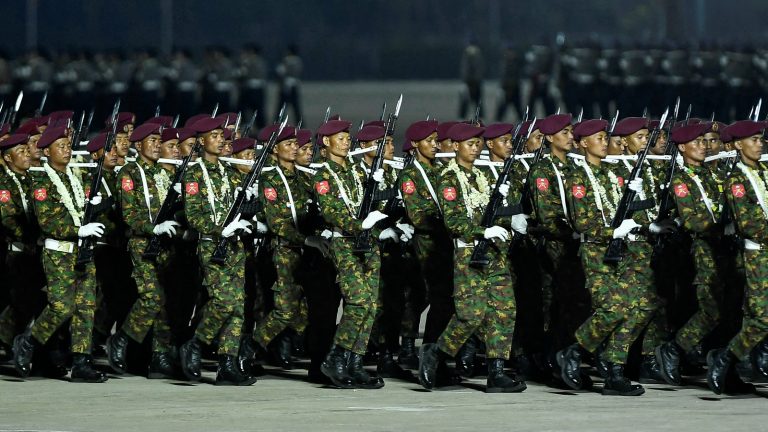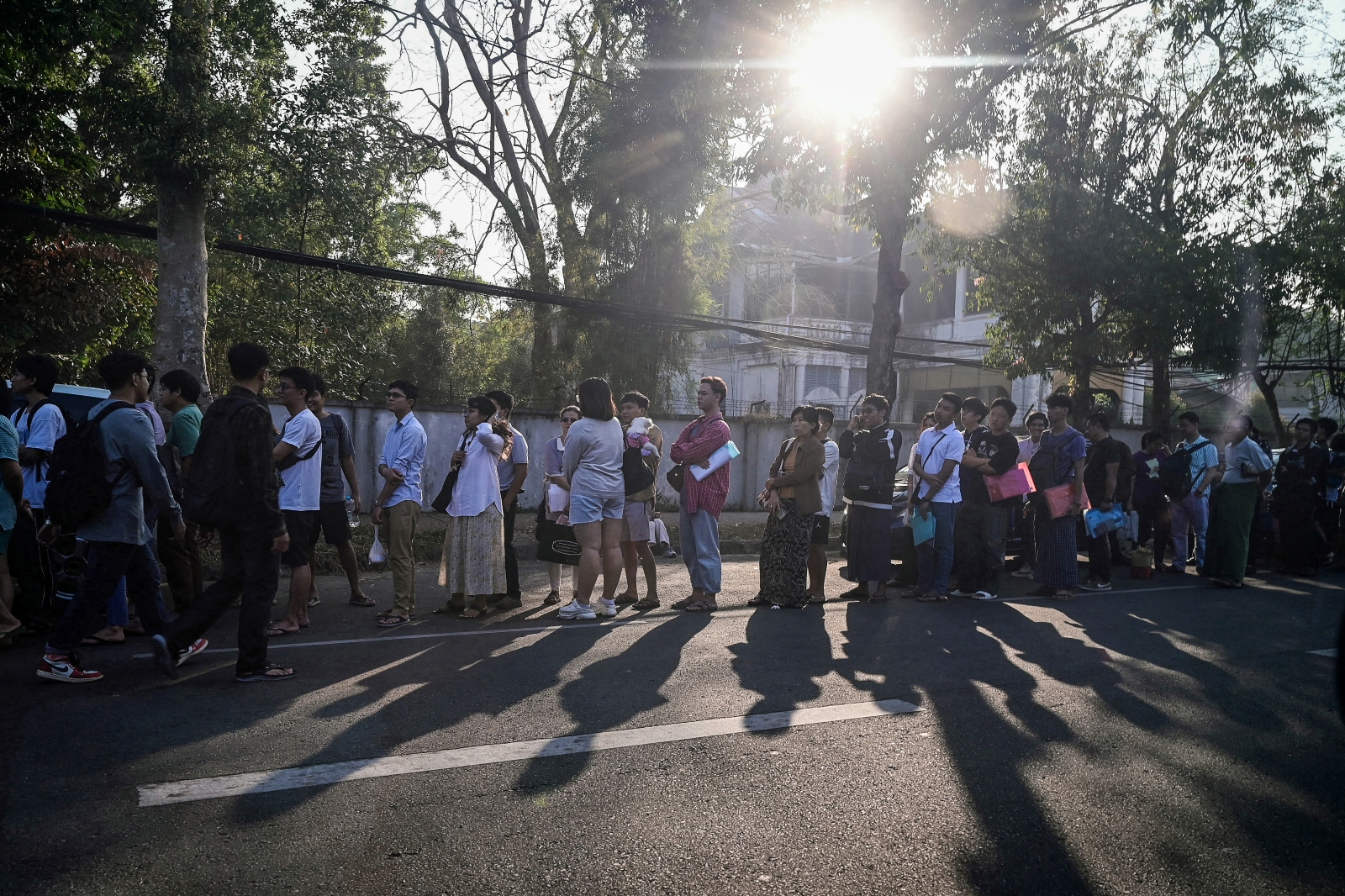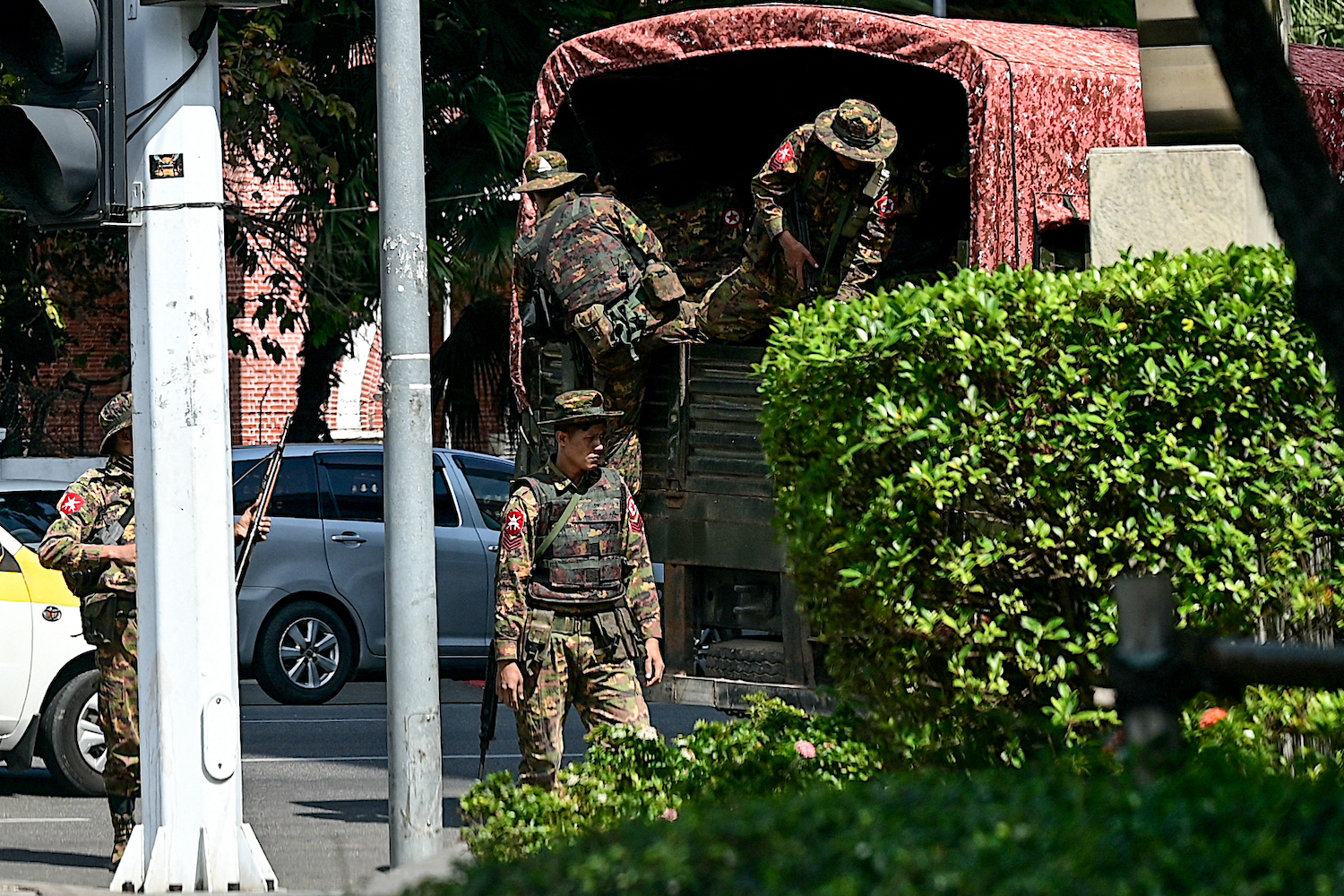The Tatmadaw is fighting to wrest control of local administration, but many of its appointed officials have been hobbled by fierce, and sometimes violent, opposition.
By FRONTIER
On May 3, at about 3pm, ward administrator U Thet Paing opened his office on Myay Ni Road, in west ward 7 of Yangon’s inner-eastern Thaketa Township. Normally, residents say, the administrator was accompanied by an assistant, but 48-year-old Thet Paing had arrived at the office by himself, seemingly unaware of the danger that awaited him.
The junta appointed Thet Paing to the posting in March. His ward office was one of many throughout Yangon that residents had forced closed in the wake of the February 1 coup, when neighbourhoods began forming their own, non-government groups to perform the administrative and law-and-order roles these offices normally play.
In Mid-March, as the junta was escalating its violent repression of protests against its rule, it tried to forcibly reopen ward and village tract administration offices all over the country. In some cases, it re-appointed elected administrators that served under the civilian government, but in others, it installed its own.
These officials, which operate under the General Administration Department but receive only a small stipend as “volunteers”, represent the lowest level of administration and are most people’s first point of contact with government. Largely a holdover from British colonial rule, their mandate is focused on maintaining law and order, and past military regimes have used these administrators to surveil and control the population. Reforms initiated in 2012 helped to reorientate their role towards serving their communities, including by making them locally elected positions. The shift of the GAD from the military-controlled Ministry of Home Affairs to the civilian-run Ministry of the Union Government Office, announced in late 2018, also helped them shed their reputation as Tatmadaw stooges.
But with local administrators back under the control of the military – which this month took the added step of returning the GAD to the home affairs ministry – many fear they are being reconstituted as the spine of a household-by-household state surveillance network.
In Thaketa’s west ward 7, Thet Paing had already faced threats and protests from angry residents. Min Min, a 25-year-old Thaketa resident, told Frontier the administrator has a reputation for confronting residents who bang pots and pans during the nightly ritual – a display of distain for the junta and the most enduring form of protest so far.
“He was known in the area as a dalan [a military informant],” Min Min said. “If people protest or bang on pots and pans, he tells the soldiers. Then, when the soldiers arrive, he directs them to the protesters’ homes.”
On April 14, for instance, Thet Paing told a woman to stop banging on her window’s metal railing one night, but the woman refused. Half an hour later, police and soldiers arrived, dragged the women onto the street, made her kneel down and then beat her. A video of the incident was shared widely on Facebook.
“The neighbours all blamed Thet Paing for that,” Min Min said.
“He is very devoted, always vigorously carrying out the junta’s orders,” a 30-year-old resident, who refused to give his name, said.
Within 15 minutes of Thet Paing opening the office by himself on May 3, three masked youths pulled up on a motorbike out front. CCTV footage from a nearby monastery shows two of the men dismount and enter the office while the third remains on the bike. Minutes later, the two run out of the office and hop onto the bike, and the three make a quick getaway.
In their wake, Thet Paing staggers out from the office, clutching himself and spilling blood. He was rushed to a nearby hospital where, by 4:30pm, little more than an hour after the attack, he was pronounced dead from his injuries. He had been stabbed four times.
Thet Paing was the first junta-installed local administrator to have been killed. Three days later, two young men on a motorbike stabbed to death the administrator of Tampawadi ward in Mandalay’s Chan Mya Tharzi Township. On May 9, the administrator of Sebaing village tract in Bago Region’s Yedashe Township was gunned down when five men stormed his home in the early morning hours and found him hiding under his bed.
While there is no official tally on ward and village tract administrator deaths, at least eight have so far been killed. The job is becoming increasingly dangerous.
‘They are very scared’
“They are trying to run our ward administration office,” said Ko Hin Oo, a 30-year-old resident of the fourth ward of Yangon’s Mayangone Township.
Residents forced the local office closed within weeks of the coup. In late March, the junta reopened the office with its own appointees. On April 26, about half an hour after the 8pm curfew, two light trucks full of soldiers and police turned slowly onto the ward’s Aung Mingalar Street, a white sedan trailing behind them. From the convoy, a loudspeaker began blaring at residents: “If there are guests at your home, please inform the ward administration office. If you have guests that are not registered with the ward office, you will be arrested for breaking the law.”
Hnin Oo said that was the first announcement he’d heard from the ward office since the military seized power.
The announcement invoked a legal requirement that every household report overnight guests to local administrators. The requirement was a key means of controlling and monitoring the population before being abolished by the National League for Democracy government in 2016; the junta reinstated it shortly after seizing power.
“Ward offices are the nation’s basic administrative unit. If they aren’t controlled and operated, you can’t really say the military holds power. That’s why they’re trying to take them over,” said Ko Lyan Htet, 30, an activist in industrial Hlaing Tharyar Township, on the western outskirts of Yangon. He tried to establish a ward administration group run by residents there just after the coup, but on March 14, following one of its deadliest crackdowns to date, the junta placed the township under martial law. Many of those involved fled into hiding.
That same evening, the junta placed the adjacent Shwepyithar Township under martial law as well.
“Our ward office reopened on March 20 and immediately announced that any households with guests had to register them,” said Ko Aung Kyaw, 28, a resident of Shwepyithar’s ward 16. “They also appointed heads of 100-household units,” he added, referring to local volunteers who have traditionally assisted ward and village tract administrators.
In addition to reporting guests, households are also required to keep up-to-date lists of all members permanently living at their home and submit them to their ward office.
“The first thing they do after opening an office is to update household member lists,” said Lyan Htet.
Ko Kyaw Gyi, a pseudonym for a junta-appointed administrator in one Hlaing Tharyar ward, served as a 100-household representative under the NLD government.
“Soldiers and police opened the ward office [near the end of March] and summoned me,” he said. While he was afraid to serve, he said, he was more afraid to refuse.
Kyaw Gyi said that although ward offices had reopened in Hlaing Tharyar, the junta has yet to appoint many of the subordinate volunteer positions, such as 100-household and 10-household representatives.
Some appointees have declined, afraid of being targeted by residents for cooperating with the Tatmadaw – and of meeting the same fate as Thet Paing in Thaketa.
“They are scared,” said Daw Tin Htwe, who lives in Hlaing Tharyar’s ward 1 and served in the ward administration office under the NLD government. “They have opened the office and have soldiers guarding it […] but they do not have enough staff, so the office is not fully operational yet,” she said.
Thet Paing’s subordinates in Thaketa’s seventh ward are also terrified, residents there told Frontier.
“It will be difficult [for the junta] to appoint the next administrator. I don’t think anyone’s willing to risk it,” said one.
The junta has also had a hard time keeping offices open in Yangon’s Mayangone, Sanchaung and South Okkalapa townships. For now, those offices only operate when soldiers are sporadically available to guard them, residents say.
“Ward administrators don’t dare to work without the presence of soldiers,” KoKyaw Oo, a pseudonym for a 40-year-old resident of South Okkalapa’s ward 13, told Frontier. “The office is open about one day a week. Administrators otherwise stay at home.”
Since mid-March, ward offices in the Yangon townships of Thaketa, Dawbon, Sanchaung, Insein, South Okkalapa, Yankin, Hlaing Tharyar, Shwepyithar, North Dagon and South Dagon have been targeted with arson and improvised explosives.
In South Dagon, where savage violence by junta forces has generated intense community hostility, ward administration has been so disrupted that junta appointees have not even started updating household member lists, a resident of the township’s ward 17 told Frontier.
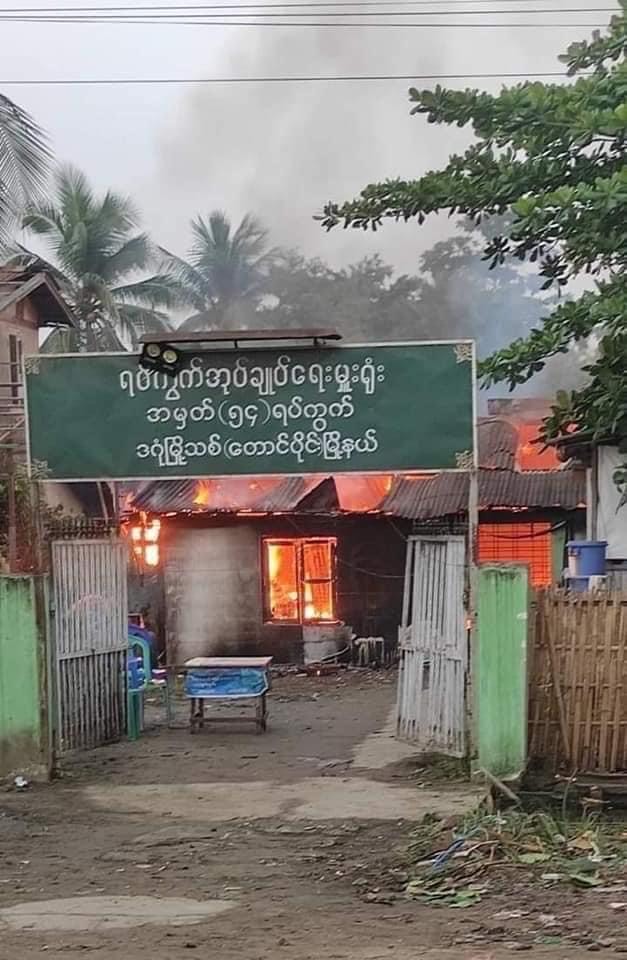
A ward administration office burns in Yangon’s South Dagon Township in April. (Frontier)
“In our ward, the administrator came to negotiate reopening the office with residents, but no one would take part, and he has not come into the office yet,” he said.
In April, the offices in the nearby 18th and 53rd wards were set ablaze.
“Now they won’t dare to open the office in our ward,” the resident said. “They are very scared.”
Village tract resistance
Similar fights are playing out in rural areas, where the junta is struggling to restore village tract administration. In Sagaing Region’s Shwebo Township, communities are increasingly taking up arms to fight a military whose killing of peaceful protesters they feel has left them with little choice.
“The military council has re-opened ward administration offices in urban areas of Shwebo, but it has no control over the surrounding countryside,” said Ko Myint Naing, 28, a Shwebo-based activist who works with parallel village administrators chosen by communities.
He said hostility towards the junta has made it impossible for them to appoint village tract administrators in the western portion of the township, including for the Thee Lone, Kyar Ywar, Sin Inn and Myin Si village tracts. Such appointees would never survive in their communities without heavy police and military protection, he added.
On April 29, two people were killed and seven others injured when villagers in Thee Lone attacked them under suspicion that they were military informants, he said.
The junta has also not yet named village tract administrators in Sagaing’s Tabayin Township – also known as Depayin, the site of a massacre of NLD supporters accompanying Daw Aung San Suu Kyi on a national tour in 2003.
“They may have already chosen people, but they haven’t been able to make an official announcement,” said Tabayin resident Ko Pho Aung, adding that the junta has been unable to fend off local armed resistance groups there.
“There are 63 village tracts in Tabayin. These protection groups are active and robust in 50 of them,” he said. “If the junta announced its picks, these groups would attack them.”
Despite this resistance, Lyan Htet doesn’t think the junta will give up any time soon, considering the crucial role ward and village tract administration plays in cementing its grip on power.
“If [local] administration offices are not functioning, the military council’s power is meaningless,” he said. “We must try to ensure that the military cannot run our ward office.”
Fighting for control
On the evening of May 3, after Thet Paing was killed in Thaketa’s seventh ward, junta forces flooded in, searching homes and interrogating residents. The next day, they began patrolling the ward in large numbers, searching random people on the street, and they beefed up patrols around other ward administration offices in the township.
“Our ward office shut down the day of the stabbing. Now, everyone in that office is terrified,” said Daw Mi Mi, a 35-year-old resident of Thaketa’s south ward 10, which is adjacent to That Paing’s and has also seen stepped-up patrols by security forces.
That ward’s administration office was among those set on fire in April. It’s been operating out of a nearby Dhammayone, a Buddhist community centre, since. Mi Mi went there to register a guest on May 5 and said there were barriers all around the entrance. Officers were not allowing people in, instead making them wait outside of a fenced yard.
“A staffer carried the documents between us and the office. He brought them out to us to fill out and sign and took them back inside,” she said, laughing at the apparent unease of the office staff. “They are very on edge.”
A rule requiring households to register their occupants each week had just been relaxed to a monthly requirement, seemingly in response to demands from residents. Mi Mi saw this as a sign that junta-appointed officials were more scared of the community than vice versa.
“We requested them last week to change from weekly to monthly but they refused. Now they’ve changed it to monthly,” she said, sneeringly.
“That really tickled me. We have a lot of control over them.”


